#Pratchat75 Notes and Errata
These are the episode notes and errata for Pratchat episode 75, “…And That Spells Trouble”, discussing the 2012 revised edition of Guards! Guards! A Discworld Board Game, designed by Leonard Boyd and David Brashaw, with guest Dr Melissa Rogerson.
Iconographic Evidence
Guards! Guards! has a lot more components than the other board games we’ve discussed so far. Here’s a gallery featuring the board and the playing pieces; and another with some of the specific cards we mentioned.

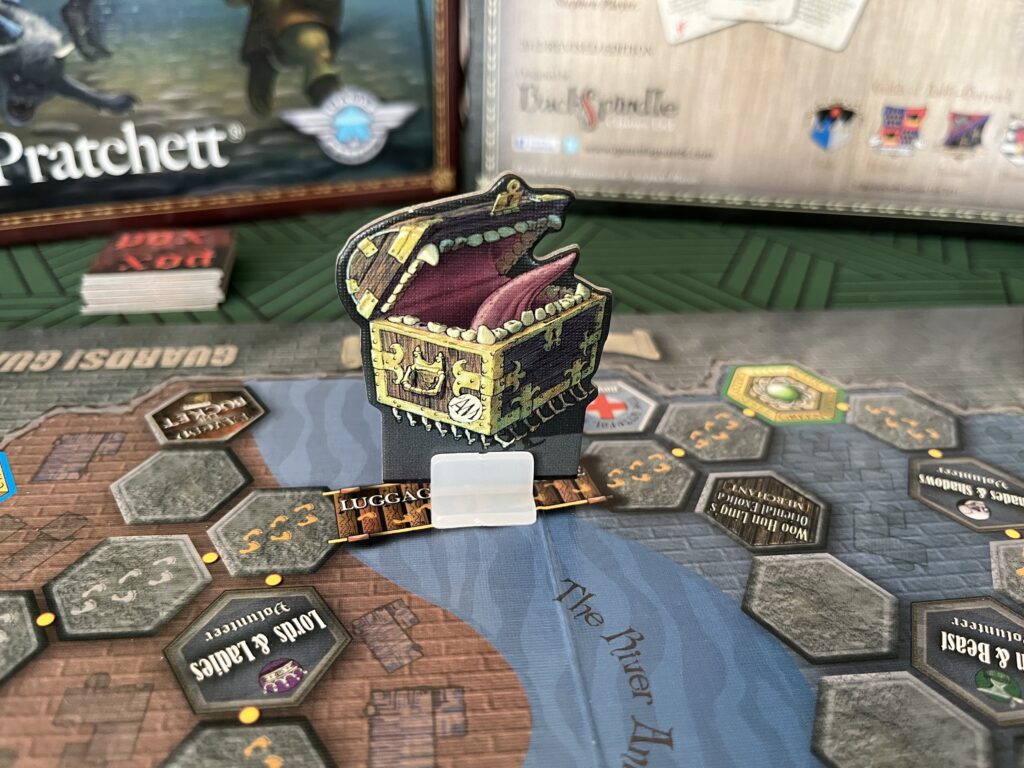
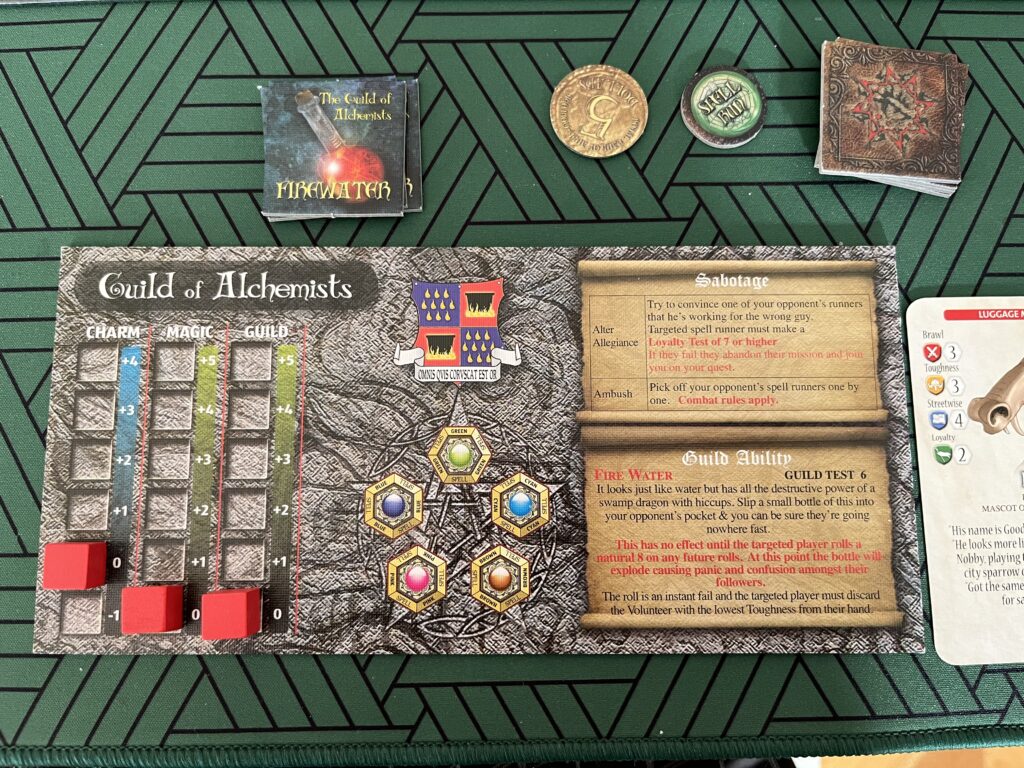
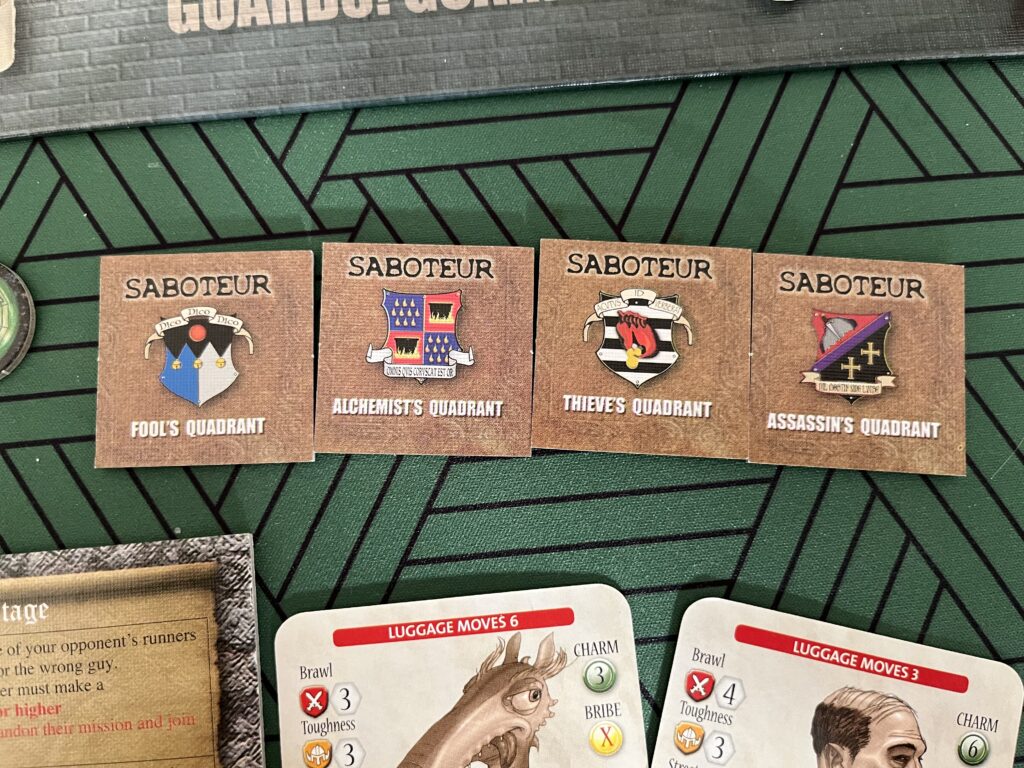
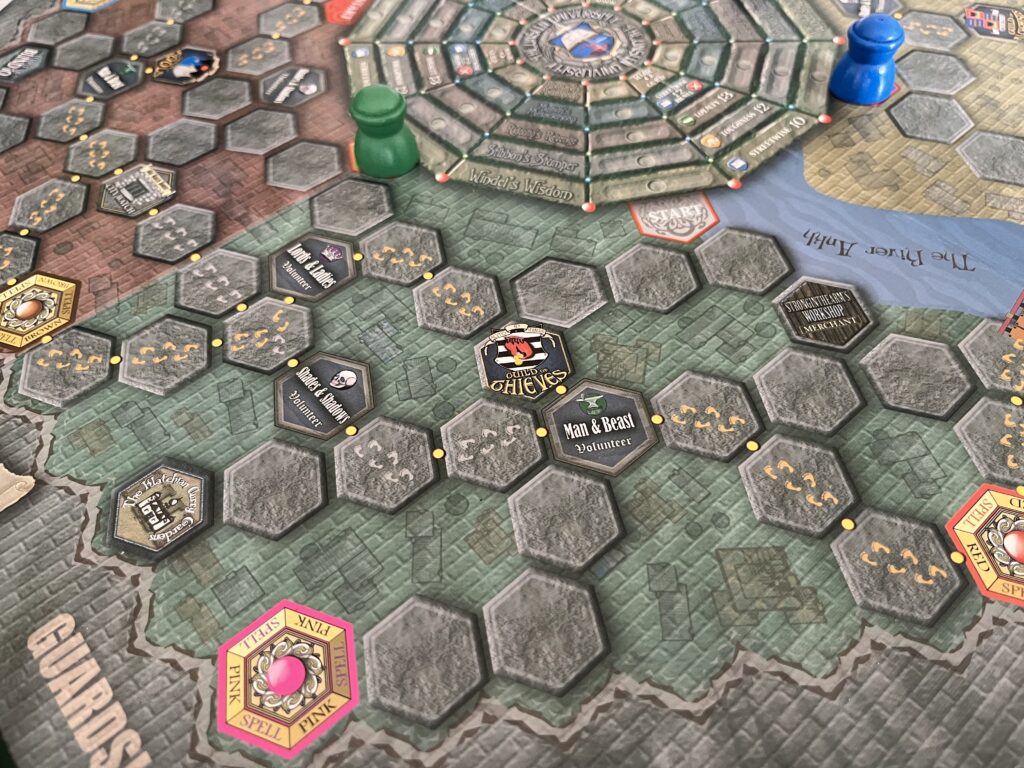
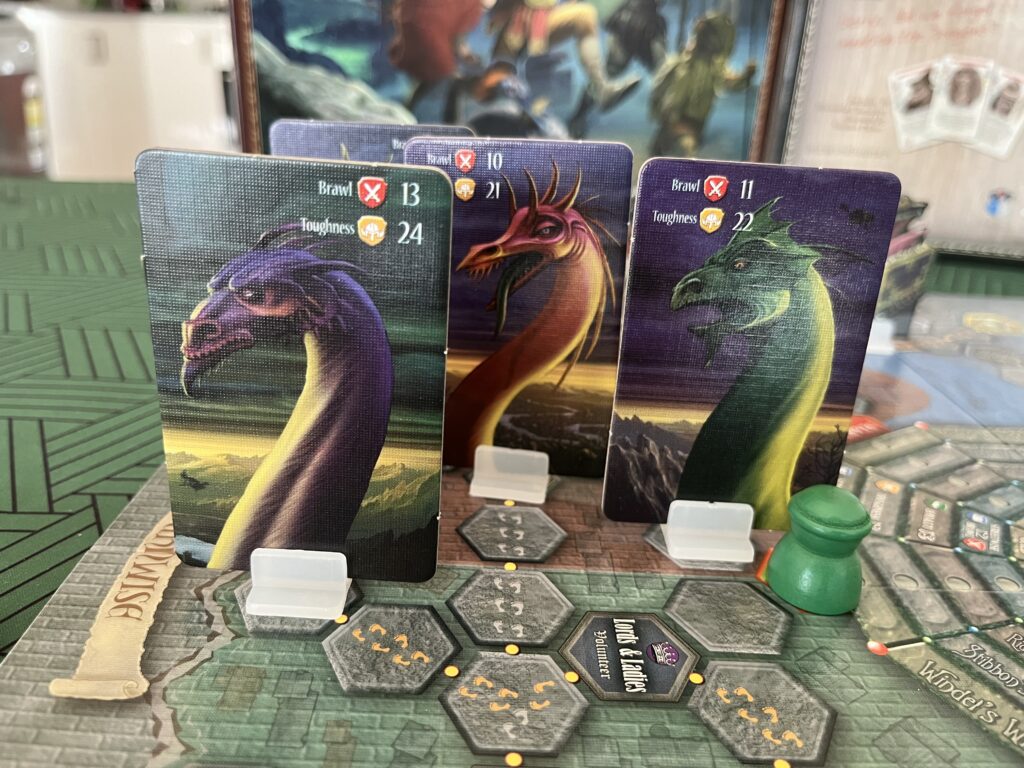
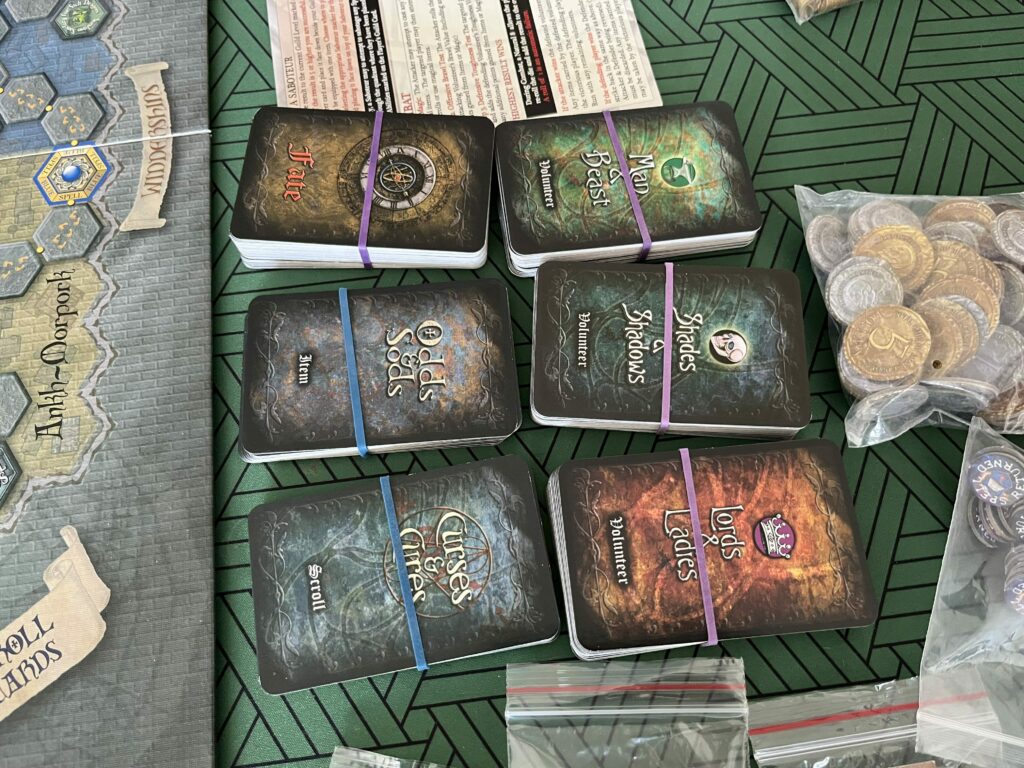
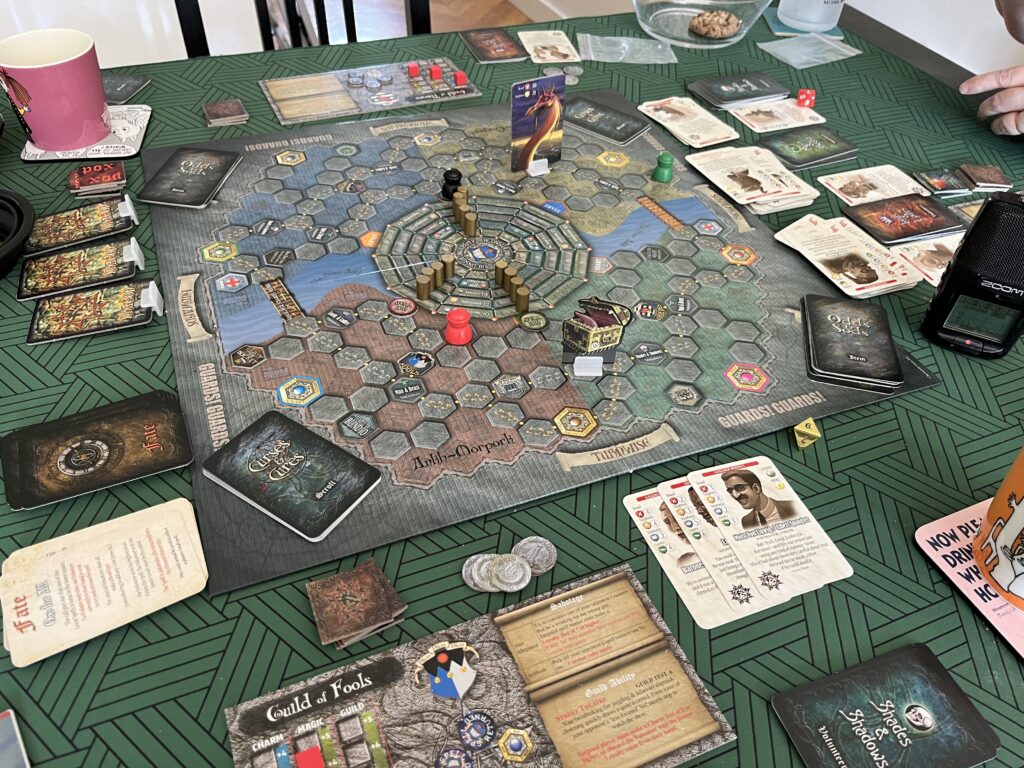
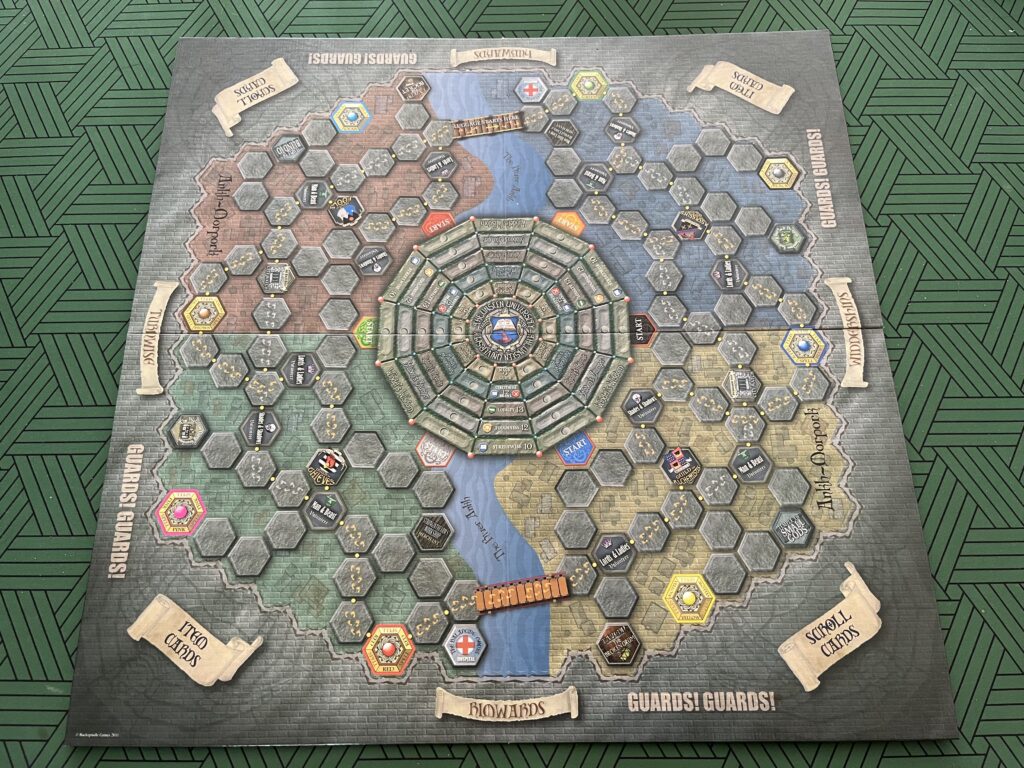
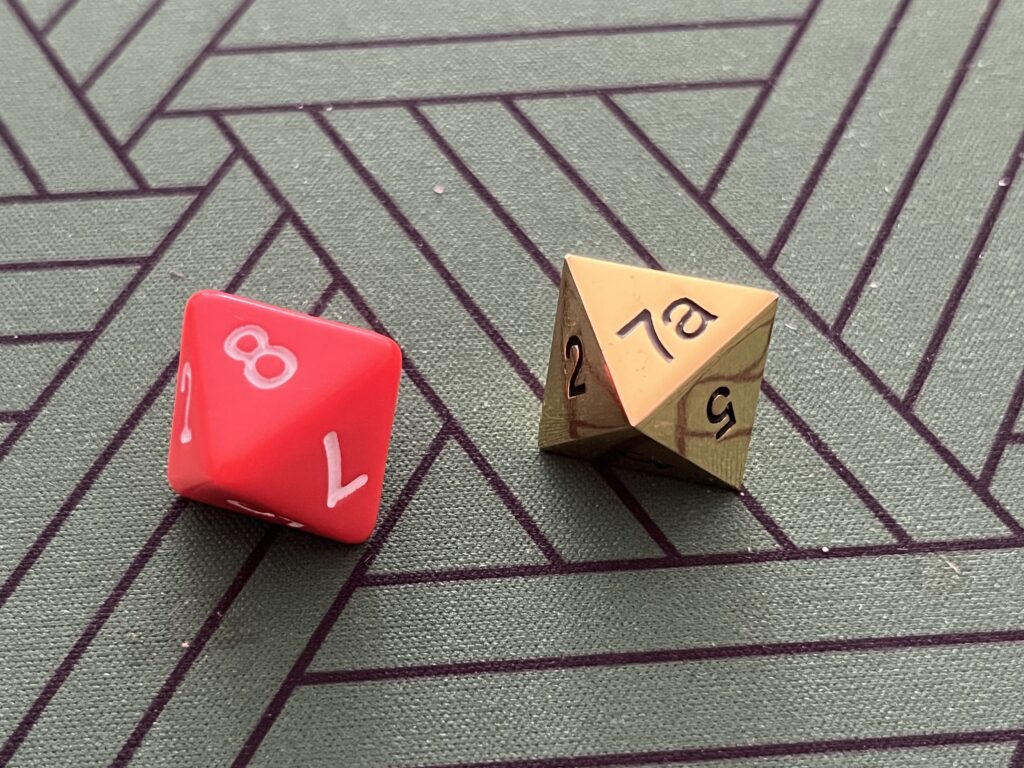
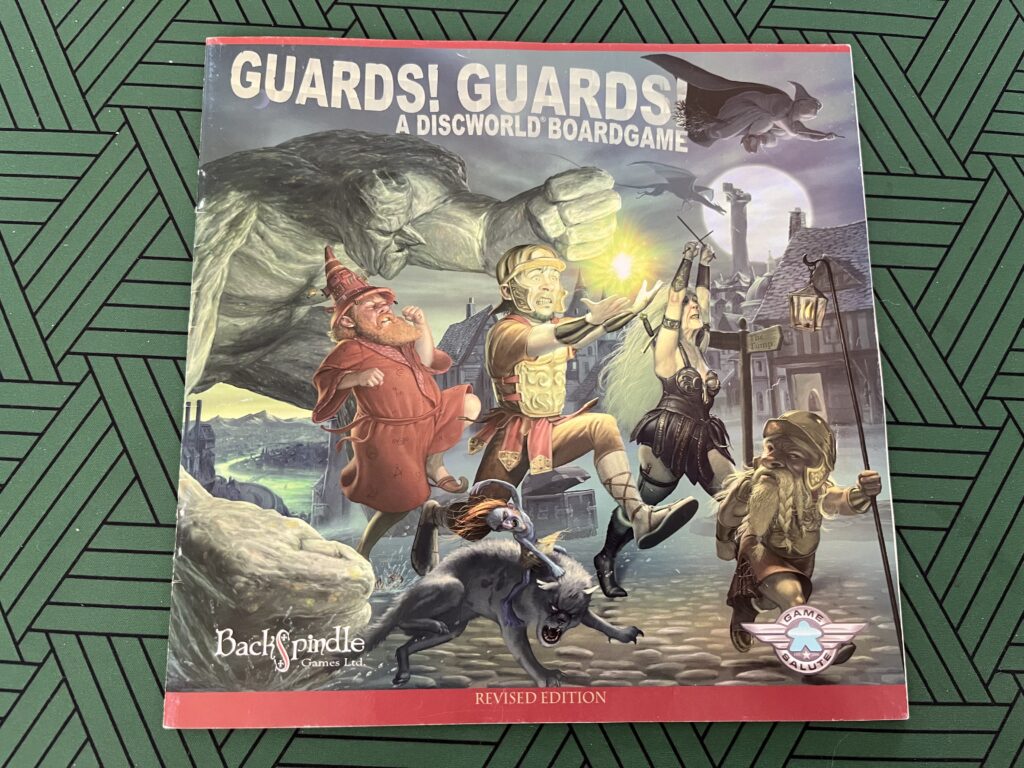
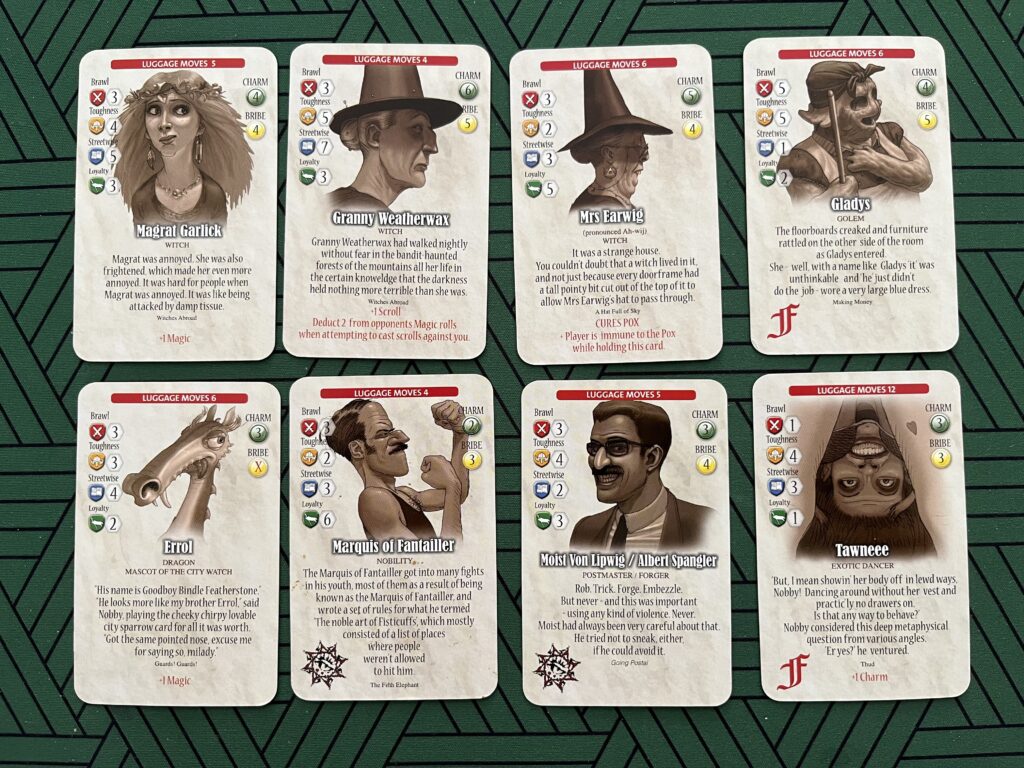
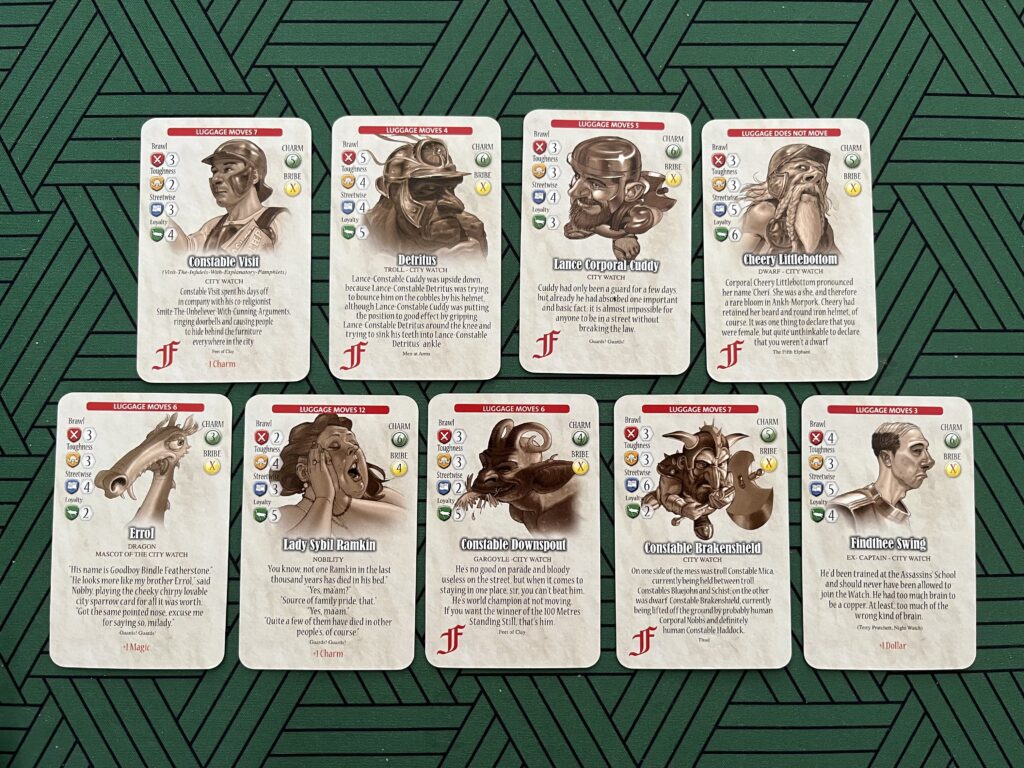
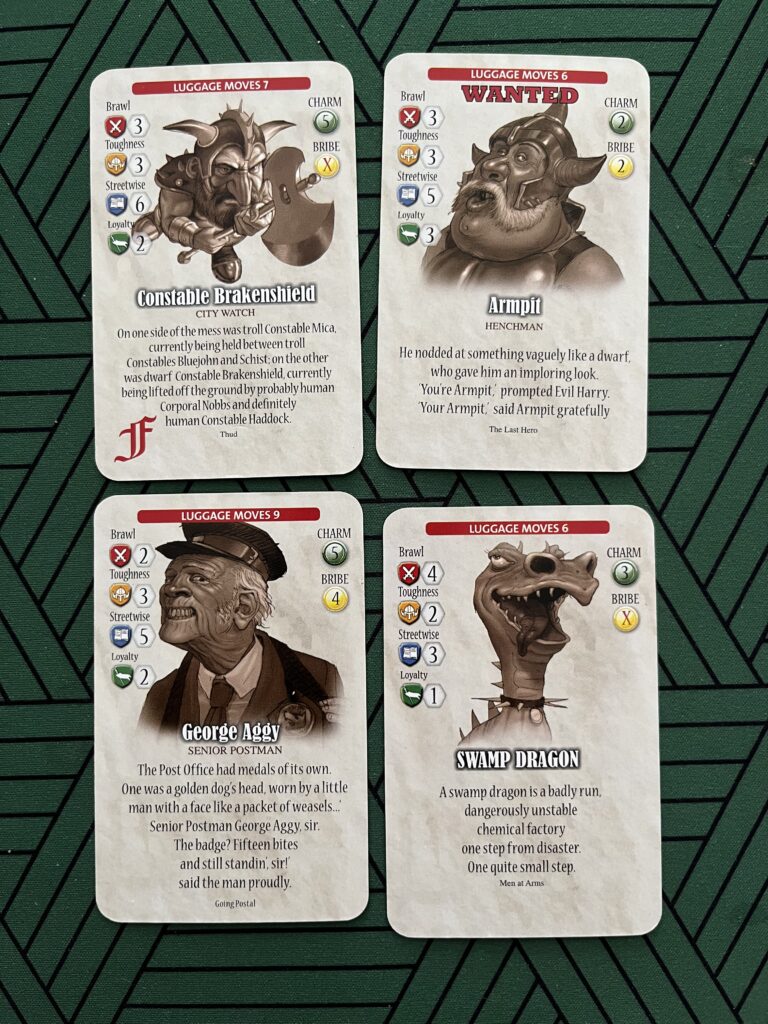
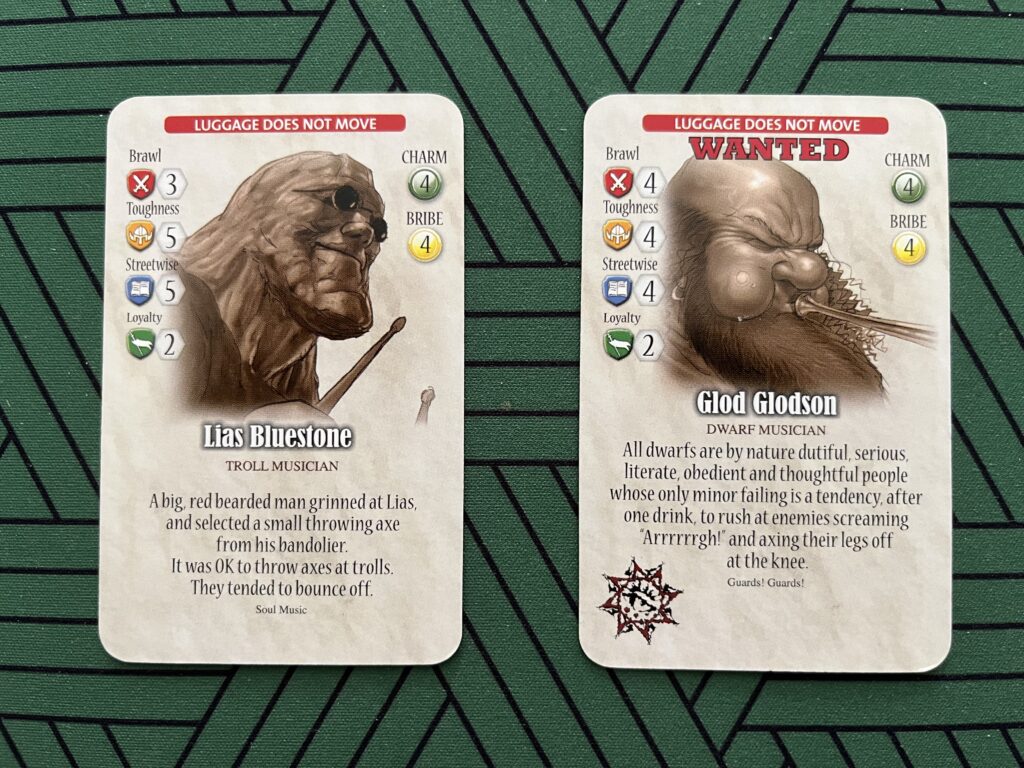
Notes and Errata
- The episode title was more or less inspired by the song “You’ve Got Trouble” from the musical The Music Man. In the song, con man Harold Hill convinces the residents of River City that they’ve got trouble, inventing spurious dangers to their youth which he blames on the introduction of a pool table to the town’s billiard parlour.
- Ben wonders how up-to-date the characters are in the game. At the time it was first published in September 2011, all but the last three Discworld novels (Snuff, Raising Steam and The Shepherd’s Crown) had been published. The game definitely includes characters from beyond the 31st novel, Monstrous Regiment, including Mrs Earwig (who didn’t appear in a novel until the 32nd book, A Hat Full of Sky); Moist von Lipwig and Gladys the golem (both introduced in the 33rd book, Going Postal); and Constable Brakenshield (a very minor charcater from Thud!, the 34th novel).
- Ben several times mentions David Brashaw’s interview with The Truth Shall Make Ye Fret; we linked to it in the main episode description, but for completeness’ sake, it’s “Picture Books and Board Games with Pratchat and David Brashaw” from 20 November 2023. David’s interview starts at around the 1 hour, 8 minutes and 45 seconds mark. (If you’ve not listened to it already, don’t skip the start; as you may have guessed from the title, Liz and Ben are also guests!)
- We’ve mentioned Miss Fisher’s Murder Mysteries many times before; it’s a television series about the high society lady Miss Phryne Fisher, who solves mysteries in 1920s Melbourne, adapted from the popular series of books by Kerry Greenwood. Liz mentions that it seems like the perfect setting for the Maquis of Fantailer, a minor character mentioned in The Fifth Elephant as the Disc’s equivalent of the Maquis of Queensberry – i.e. the nobleman who invented rules for boxing as a sport, which are entirely useless in a street fight.
- Mrs Harris Goes to Paris (2022, dir. Anthony Fabian) is a British film adaptation of the 1958 novel Mrs ‘Arris Goes to Paris. It tells the story of Ada Harris, a working class cleaner whose husband died in World War II; she never realised she was supposed to receive a war widow pension and when she is paid it in arrears, uses the windfall to visit Paris in the hopes of buying a Dior dress.
- On BoardGameGeek, a game’s “weight” is described as a measure of how difficult it is to understand (though not everyone thinks of it that way). A heavier weight generally means more rules and/or components, and more complex interactions and strategies; the scores are Light (1), Medium Light (2), Medium (3), Medium Heavy (4) and Heavy (5). Guards! Guards! has a weight (averaged from votes by users of the site) of 2.61 out of 5, so between Medium and Medium Light. For comparison, Monopoly scores 1.65 (between Light and Medium Light), while Chess has a weight of 3.66. (In case you’re interested, the heaviest game in Ben’s collection is Oath: Chronicles of Empire & Exile, with a rating of 4.11; he also has a lot of party games with a weight at or near 1.0, but most of his favourite games are Medium or Light Medium.) We’ve listed the weight of the other games suggested below for contrast, but keep in mind it’s a subjective measure; most games fall in between two of the scores.
- Shut Up & Sit Down (SUSD) was launched in 2011. Its major components are a YouTube channel, where they are best known for their funny but thoughtful board game reviews, and a website, where they have extensive forums and written reviews and features as well. They’ve also expanded to produce a podcast, and a games convention, SHUX, which is held in Vancouver, Canada. If you like their stuff, Ben reckons you’ll also like No Pun Included, who make similarly in-depth and funny board game review videos, and also have a website and podcast (now called Talk Cardboard).
- Unsurprisingly, we mention a lot of board games in this episode. Here’s a full list; links are to the game’s entries on BoardGameGeek.
- Talisman (weight 2.17, Medium Light) was first published in 1983, but hit it big with the second edition in 1985. Players take are one of many fantasy archetypes like wizard, barbarian, sorceress and thief, all racing around a slightly Monopoly-like board having weird encounters as they try to reach the centre space and claim the Crown of Command. The currently available revised fourth edition is substantially similar to the earlier versions, and was first released in 2007.
- Dungeon! (weight 1.56, Light/Medium Light) was first published in 1975 by TSR, the company behind Dungeons & Dragons at the time. Players choose a “class” (elf, hero, superhero or wizard) and then delve into the chambers of a board designed like a dungeon, hoping to fight monsters and steal their stuff. The most recent edition was first published in 2014 by D&D’s current owners, Wizards of the Coast, and hasn’t changed much except the art and production values.
- The Witches (weight 1.66, Light/Medium Light) is the previous Discworld board game we covered on the podcast, in #Pratchat67, “The Three-Elf Problem”. Ben mentions it’s the “other Martin Wallace one”, the first one being Ankh-Morpork, which we have yet to discuss.
- King of Tokyo (weight 1.49, Light/Medium Light) was first published in 2011, and has remained popular. There are a few spin-offs, including King of New York and King of Monster Island, which feature twists on the original; and plenty of expansions, mostly extra giant monsters. It also comes with a set of very satisfyingly big and heavy dice, which use symbols instead of numbers.
- Survive: Escape from Atlantis! (weight 1.70, Medium Light) was first published in 1982, and sees players trying to get as many of their ten people to safety as possible as Atlantis sinks. The fun twist is they’re once the game starts, you can’t look at the bottom of your people tokens – and they’re each worth a different number of points. A 30th anniversary edition is still in print. The dolphin, giant squid and two other expansions were available combined in one box, but are a bit hard to find now.
- Reign of Cthulhu (weight 2.16, Medium Light) is the 2016 game Liz mentions playing at a board game cafe in New Zealand. It is based on Pandemic by Matt Leacock, but is now marketed as a “Pandemic System Game” rather than having “Pandemic” in the title. Players work together to close magical gates to other dimensions before an ancient “Old One” – a cosmic entity with the power of a god – arrives to destroy the world.
- Castles of Mad King Ludwig (weight 2.65, Medium Light/Medium) has players trying to build a castle that will please the randomly selected whims of the King. It’s (very) loosely based on the real King of Bavaria, Ludwig II, who spent his fortunes on building a number of lavish castles during the nineteenth century, earning him the nickname “the Fairytale King”. Ben also likes the spin-off game The Palace of Mad King Ludwig, in which all the players build the same castle.
- Big Top (weight 1.03, Light) from GameWright is, as Melissa mentions, one of many versions of the game originally published as Barnyard Buddies in 1996. (The versions are pretty much identical aside from art and theme, so there’s just one entry for all of them on BGG.)
- Kingdomino (weight 1.22, Light) is a 2016 game in which players build medieval kingdoms by playing domino-like tiles showing various kinds of land, like fields, lakes and mountains. It’s been a pretty big success and has spawned many spin-offs and similar games, including Queendomino, which can be combined with the original.
- Daybreak (weight 2.96, Medium) is Matt Leacock’s 2023 game of fighting climate change. It’s really interesting and important, but also great fun to play. Has a great solo mode.
- Paperback Adventures (weight 2.70, Medium) is a solo deckbuilding game where you make words out of letter cards to generate points used by your protagonist character to fight a series of six villains. It does have rules for two players, but they’re generally not considered that great; but you can play it with multiple players cooperating to work out the best word to play! Ben has all three of the available characters, and loves them all, but if he had to pick a favourite it’s a toss-up between assassin princess Damsel and undead pirate Plot Hook.
- Liz mentioned the Quarter Quell, which she also referenced last episode; it’s a special version of the Hunger Games (from the book series of the same name by Suzanne Collins), a death match by lottery imposed by the fascist state, where they bend the usual rules to make it even more horrible.
Thanks for reading our notes! If we missed anything, or you have questions, please let us know.
